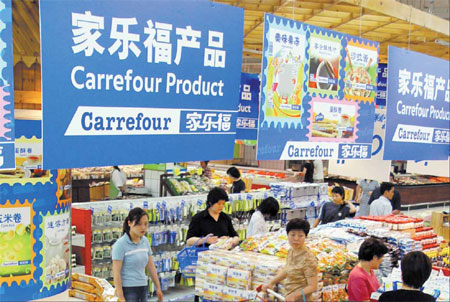So much to choose from
Updated: 2013-07-26 09:07
By Cecily Liu, Chen Yingqun and Qiu Bo (China Daily)
|
|||||||||||
|
Increasing urbanization has created opportunities for foreign brands as people become more demanding and discriminating in what they buy. Provided to China Daily |

China's growing hordes of savvy consumers provide new opportunities for foreign brands
Increasing sophistication is walking hand in hand with urbanization to retail counters all around China. As well as creating millions more consumers with rising incomes, rapid urban expansion is also creating far more demanding and discriminating consumers, and in the process, creating new opportunities for foreign brands.
"Urbanization plays an important role in that it makes people more exposed to brands or products than in towns or villages," says Jeff Walters, a partner and managing director of Boston Consulting Group Greater China.
Foreign companies have great advantages in China, he says, as they are often supported by brand reputation and heritage, especially in areas where quality is important to the Chinese consumer, such as luxury products and food.
Such advantages are particularly pertinent to supermarkets and hypermarkets, which can stock more than 200,000 brands of merchandise at any one time.
These superstores scarcely existed a few decades ago when China was mostly a rural society. But as the country opened up, cities grew and the market economy developed, retail chains such as Wal-Mart, from the US, Carrefour of France, and the UK's Tesco moved in and have expanded in China with global expertise in management as their key advantage.
Christina Lee, senior director of corporate affairs at Wal-Mart China, says the company has about 400 stores in China, with 80 percent of them located in second and third-tier cities.
She says it is now looking to open more stores in smaller Chinese cities where competition is less fierce.
"Customer needs are always our top priority," she says. "We will open new stores where we find that need and the market is ready.
Chinese consumers welcome hypermarkets, Lee adds, because they provide a wide variety of products at cheaper prices, achieved through economies of scale.
"Our consumers at all income levels want to protect their savings and are insisting on lower prices and better value, which leads to smarter shopping. They are moving away from wet markets or smaller grocers and choosing hypermarkets, where product quality and food safety standards are more consistent and prices lower," she says.
To ensure competitive prices, Lee says Wal-Mart focuses on simplifying business processes to save operational costs, lowers the cost of goods by sourcing them directly from suppliers, centralizes and maintains good relationships with suppliers, improves supply chain efficiency, and reinvests these savings in the business.

Good quality and safety, especially for food items, is also key to satisfying Chinese consumers, says Thierry Garnier, president and CEO of Carrefour China.
Garnier says that Carrefour has set up 43 mini-laboratories across China and four large-scale laboratories in major cities to conduct daily random investigations of food quality.
The bigger laboratories, in Beijing, Shanghai, Chongqing and Shenyang, test food safety using 65 parameters such as extent of pesticide residue and food additives and preservatives. The smaller labs have facilities for testing 11 parameters.
The Chicago-based Dover Corporation is also benefiting from China's increasing population of quality and safety-conscious consumers. Its printing and identification section, which first came to China in 1991 to provide services for industrial products, focuses more today on printing services for consumer products such as food, beverages, cosmetics, and personal care and pharmaceutical products.
It prints "best before" dates and codes that trace products back to source.
"China's consumption of packaged goods is growing, and Chinese customers are very brand conscious," says John Hartner, CEO of Dover's printing and identification division. "Our printing and labeling solutions help them find products of high quality from good sources that are fresh and safe."
Dover's customers in China range from multinational brands such as Pepsi and Nestle to Chinese ones like Tsingtao Beer, Want Want and Mengniu Dairy.
The faster lifestyle in urban centers has also fuelled the growth of fast food chains. The US chain Subway has 400 stores in China and plans 80 more this year. It aims to have 900 by 2015, and 1,600 by 2017.
"White-collar workers in the city are really busy. They opt for convenience and they want a quick lunch," says Tomaz Hladnik, Subway Greater China area manager.
He says Subway is to add 20 stores in first-tier cities and 15 in second-tier ones every year, convinced that China's bigger cities are still experiencing increasing demand despite the availability of many fast-food outlets.
Because Chinese consumers are becoming more concerned about food safety, he believes Subway's method of making sandwiches in front of customers gives it an advantage.
Another is in letting them select ingredients, rather than offering them standard meals already prepared.
Along with the fashion retail industry, the market for electric appliances has also witnessed a growing number of foreign companies.
British technology company Dyson only entered China last November, opening stores in Beijing and Shanghai to sell vacuum cleaners, hand driers, and bladeless fans and heaters.
Company founder James Dyson says he has been surprised by how much people's preferences have converged globally over the past few years. People want smaller, more efficient technology that makes their lives easier, and Dyson's cordless technology has proven popular in China, he says.
Ira Kalish, director of global economics at Deloitte Research, says Chinese consumers are becoming more sophisticated mainly because of the Internet, with growing awareness of global brands and trends.
Consumers are increasingly giving feedback about specific products, so that other consumers can make more informed buying decisions, he says.
"For foreign and domestic sellers, it is critical to provide information about product attributes, to maintain a high quality of products, and to price competitively," Kalish says.
E-commerce has also allowed many foreign luxury or designer brands to enter China's market without a physical presence, says Jessie Qian, partner in charge of KPMG China's consumer markets.
"Shopbob.com, for example, has very good user experience," she says. "They have a Chinese website and offer free delivery. Such platforms offer new market entrants an opportunity to test the water and get data about the Chinese consumer."
However, Qian points out that foreign brands lack knowledge of the local market, compared with domestic companies, so extensive market research is necessary.
"Some of our clients have research and development centers in China to learn Chinese consumers' tastes and preferences," she says.
But China's urban consumer market is prevented from reaching its full potential because of income inequality and the lack of social security for migrant workers, says Wu Jiangang, a research fellow at China Europe International Business School's Lujiazui International Finance Research Center.
"Without adequate social security provision and necessary social welfare, those with low wages would worry about basic expenditure, and have to save up more and spend less," Wu says.
"China is only just over 50 percent urbanized, but it has the potential to become 60 to 70 percent urbanized in the next decade. This trend's contribution to building China's sustainable economic growth is immense."
Therefore, Wu says, the government should act on people's concerns about spending on housing, education, pensions and healthcare by improving the country's social security system.
He says this can be achieved by setting up a social welfare system and building more social housing, allowing migrant workers to live, work and receive social and medical care in cities.
"But stimulating consumption is hard to achieve only by fiscal stimulus," Wu adds. "What the Chinese government should do is to encourage the growth of Chinese small and micro-sized enterprises, including small-scale financial enterprises."
This could be done by policies such as reducing market entry barriers, helping state-owned enterprises step back from competitive industries, and reducing tax levels, so they can provide more employment opportunities to accommodate an increasing migrant worker population and continuously support urbanization.
Contact the writers through celicy.liu@chinadaily.com.cn
(China Daily European Weekly 07/26/2013 page24)
Today's Top News
List of approved GM food clarified
ID checks for express deliveries in Guangdong
Govt to expand elderly care
University asks freshmen to sign suicide disclaimer
Tibet gears up for new climbing season
Media asked to promote Sino-Indian ties
Shots fired at Washington Navy Yard
Minimum growth rate set at 7%
Hot Topics
Lunar probe , China growth forecasts, Emission rules get tougher, China seen through 'colored lens', International board,
Editor's Picks

|

|

|

|

|

|






